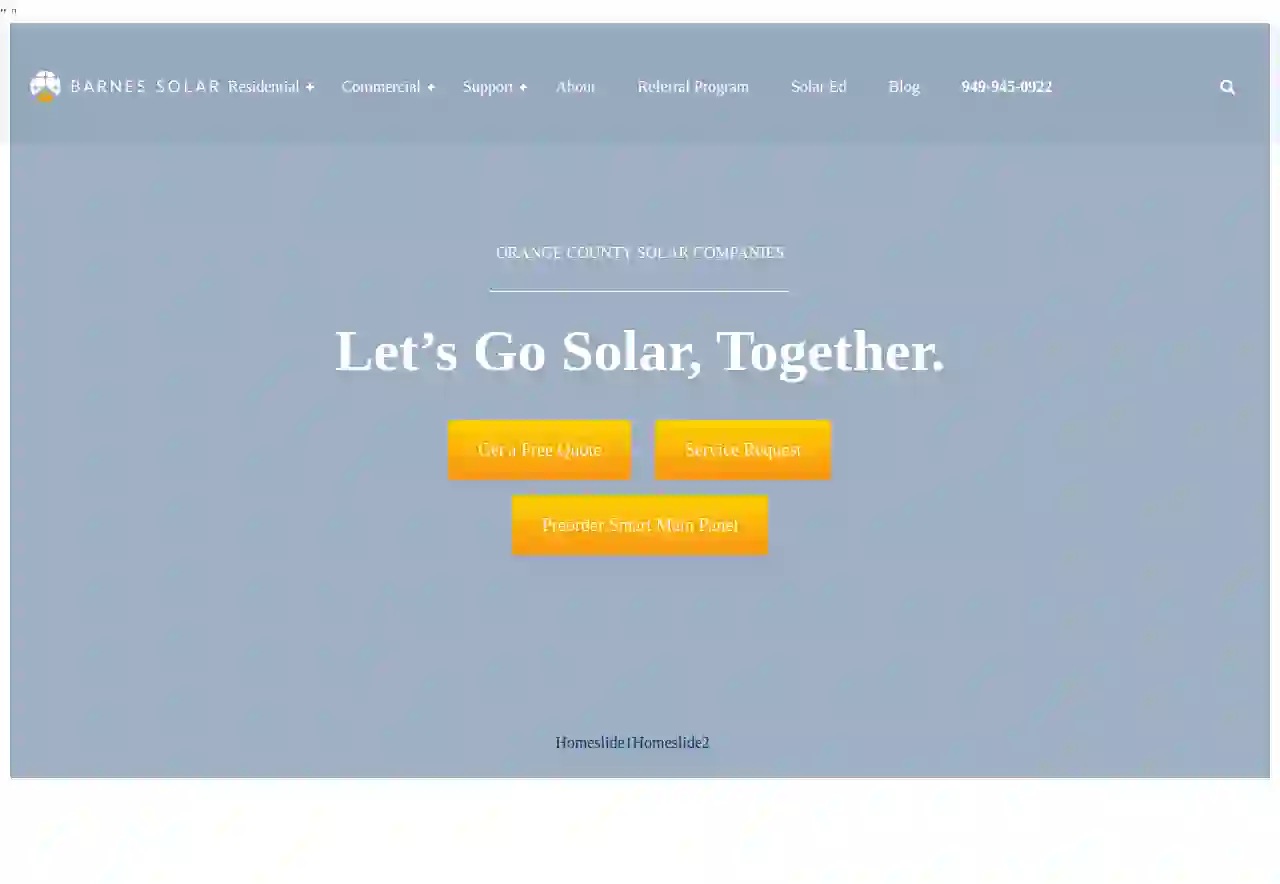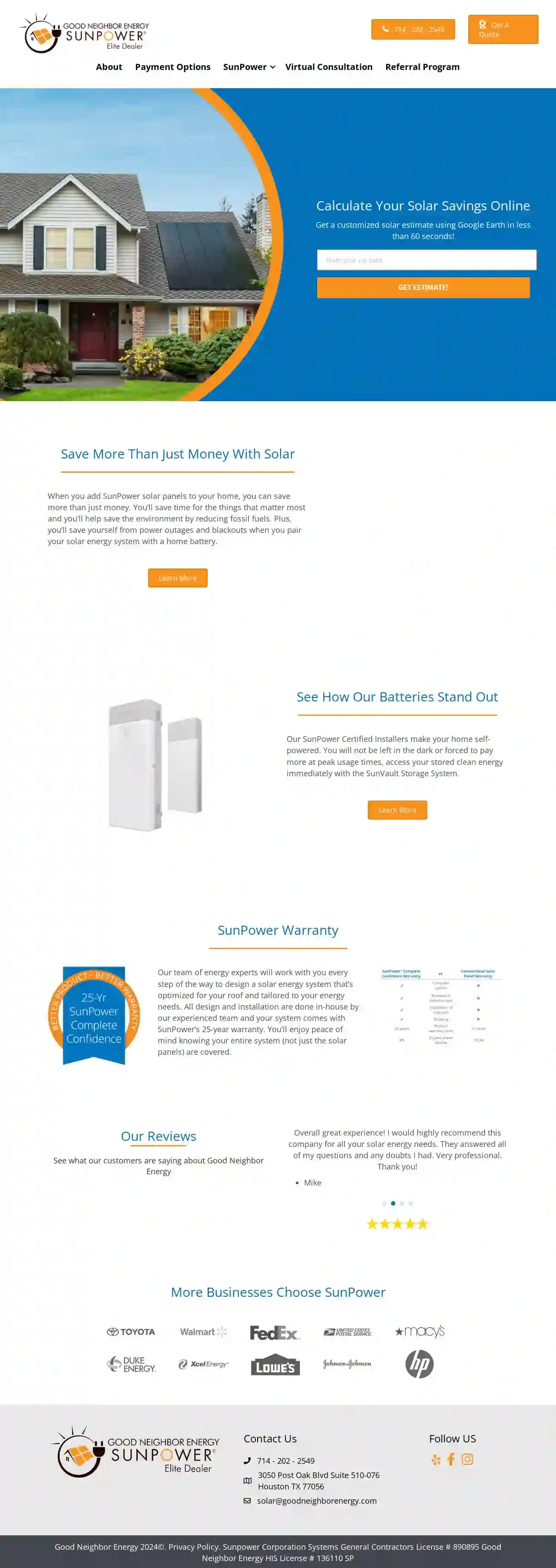Commercial Solar Installers Anaheim
Best Commercial Solar Installers in Anaheim
Receive multiple Commercial Solar Company quotes for your project today! Compare profiles, reviews, accreditations, portfolio, etc... and choose the best deal.

Go Green Solar
4.5100 reviews1630 South Sunkist Street Ste E, *Appointments required for in-person service. Please contact us to make an appointment., Anaheim, 92806, USGoGreenSolar is a leading provider of solar energy solutions, offering a wide range of solar kits, solar panels, and accessories. With over 18 years of experience, they have helped thousands of Americans transition to solar energy. Their team of experts provides tailored solutions, ensuring optimal system performance and a hassle-free installation process.
- Services
- Why Us?
- Accreditations
- Our Team
- Testimonials
- Gallery
Get Quote
Barnes Solar
4.761 reviews704 N Valley St Unit R, Anaheim, 92801, USBarnes Solar is a company that has been in the solar panel installation business for over 10 years. We are a small business, founded in 2009, and we have thousands of residential and commercial solar panel installations across Southern California. We have a reputation for quality service and construction, so you can be sure that your installation will be done correctly and on time. We also offer competitive quotes so you can find the best deal possible.
- Services
- Why Us?
- Accreditations
- Our Team
- Testimonials
- Gallery
Get Quote
EcoSolar USA
4.535 reviews13902 Harbor Blvd, Unit 2A, Garden Grove, 92843, USEcoSolar USA is a trusted local solar installer with over 10 years of experience in the solar energy industry. They have assisted numerous clients in achieving maximum efficiency and cost savings in their energy usage. Their team is knowledgeable about the latest technologies and advancements in the field and uses this expertise to design, install, and maintain solar energy systems that meet the unique needs of each client. They pride themselves on their commitment to providing exceptional customer service and ensuring satisfaction with their work.
- Services
- Why Us?
- Accreditations
- Our Team
- Testimonials
- Gallery
Get Quote
Buena Park Solar Panel Installation
12672 Hoover St., Garden Grove, CA, 92841, USGood Neighbor Energy is a local business that specializes in providing sustainable energy solutions to homeowners. They offer a range of services including solar panel installation, battery storage, and warranty services. Their mission is to give communities access to clean renewable energy one neighborhood at a time. They pride themselves on their seamless and compassionate process, providing high-quality customer service and project support.
- Services
- Why Us?
- Accreditations
- Our Team
- Testimonials
- Gallery
Get Quote
Nexus Energy Systems
4.6157 reviews10692 Stanford Ave. Unit A, Garden Grove, CA 92840, 92840, USNexus Solar is a premier residential solar developer with over 40 years of experience in the industry. They offer a range of services including solar systems, Tesla battery storage, Enphase Encharge battery storage, and roofing. Nexus Solar has an A+ BBB rating and is known for its commitment to customer service and satisfaction. They provide a 25-year warranty on their products and offer a power production guarantee. Nexus Solar has offices in California, North Carolina, New Mexico, and Virginia.
- Services
- Why Us?
- Accreditations
- Our Team
- Testimonials
- Gallery
Get Quote
Planet Plan Sets LLC
1630 S. Sunkist St. Suite E., Anaheim, CA 92806-5816, 92806-5816, USPlanet Plan Sets is a full service provider of solar plan sets for residential PV installations. Our team has decades of combined experience in the solar industry. We believe PV is a better way to power our future and by reducing the complexity of plan set generation, we help contractors focus on what they do best – installing PV systems. We are committed to reducing the cost, time, and hassle of drafting plan sets for solar installations. We strive to exceed customer expectations by delivering cost effective solar plan sets quickly and reliably, with customer support and service that sets us apart from the competition.
- Services
- Why Us?
- Accreditations
- Our Team
- Testimonials
- Gallery
Get Quote
SunPower Corporation
3.8128 reviewsSan Jose, CA, 70 Rio Robles, 94043, USSunPower is a leading solar company in the U.S. with nearly 40 years of experience and expertise. They offer unmatched heritage, quality tested and built to last products, and customized solar systems for homes. Their mission is to make clean energy and storage accessible to everybody.
- Services
- Why Us?
- Accreditations
- Our Team
- Testimonials
- Gallery
Get Quote
Solar 360
4.235 reviewsN/A, USSolar 360 is a leading provider of solar installation and battery storage solutions for residential and commercial properties in Orange County, Riverside, Los Angeles, San Diego, and the Inland Empire. With over 10,000 solar panels installed, we offer top-tier solar technology, cost-effective solutions, and a 25-year service and installation warranty. Our team of experts will design and install the perfect solar system for your needs, helping you reduce your carbon footprint and save on your monthly utility bill.
- Services
- Why Us?
- Accreditations
- Our Team
- Testimonials
- Gallery
Get Quote
American Solar Aide, Inc
123 Solar Way, Los Angeles, 90001, USAmerican Solar Aide is a full-service solar company that offers a premium solar experience. They handle every detail of your switch to solar, from start to finish, including custom-designed systems using high-quality equipment, dedicated project managers, and experienced installation teams. Their goal is to provide a smooth transition to solar and offer the best equipment available at the best prices on the market.
- Services
- Why Us?
- Accreditations
- Our Team
- Testimonials
- Gallery
Get Quote
SunPower by Sun Solar-OC
4.519 reviews123 Solar Way, Suite 100, Irvine, 92660, USSunpower by Sunsolar OC is a local business dedicated to providing accessible and user-friendly services to all customers, regardless of their abilities. The company aims to adhere to the World Wide Web Consortium's Web Content Accessibility Guidelines 2.1 (WCAG 2.1) at the AA level, ensuring that the website is accessible to people with a wide array of disabilities. Sunpower by Sunsolar OC utilizes various technologies to make the website accessible, including an accessibility interface that allows users to adjust the website's UI and design it to their personal needs. The website also uses an AI-based application that runs in the background and optimizes its accessibility level constantly.
- Services
- Why Us?
- Accreditations
- Our Team
- Testimonials
- Gallery
Get Quote
Over 4,210+ Solar Installers in our network
Our solar contractors operate in Anaheim and surrounding areas!
SolarCompaniesHub has curated and vetted Top Solar Installers in Anaheim. Find a trustworthy business today.
Frequently Asked Questions About Commercial Solar Installations
- Ample Space: Flat roofs typically have more usable space than sloped roofs, allowing for larger solar arrays and greater energy production.
- Ease of Access: Flat roofs are generally easier to access for installation and maintenance.
- Flexibility in Orientation: Solar panels on flat roofs can be tilted and oriented in any direction to optimize sun exposure.
- Qualified Installers: Ensure your installer has the necessary experience, training, and certifications to work safely on commercial roofs and with electrical systems.
- Fall Protection: Proper fall protection measures, such as harnesses and safety lines, must be used when working on roofs to prevent falls.
- Electrical Safety: Solar panels generate electricity, so proper wiring, grounding, and safety disconnects are crucial to prevent electrical shock or fire hazards.
- Fire Safety: Solar panel systems are designed to be fire-resistant, but it's essential to choose reputable brands with appropriate fire ratings and to ensure proper installation to minimize fire risks.
- Permitting and Inspections: Obtaining permits and undergoing inspections by local authorities helps ensure the installation meets safety codes and standards.
- Ongoing Maintenance: Regular maintenance checks by qualified professionals help identify potential safety issues and ensure the system remains safe and operational.
What is the lifespan of a commercial solar system?
Can I install solar panels on a flat commercial roof?
What safety considerations are involved in commercial solar installations?
Can I add battery storage to my commercial solar system later?
What is the lifespan of a commercial solar system?
Can I install solar panels on a flat commercial roof?
- Ample Space: Flat roofs typically have more usable space than sloped roofs, allowing for larger solar arrays and greater energy production.
- Ease of Access: Flat roofs are generally easier to access for installation and maintenance.
- Flexibility in Orientation: Solar panels on flat roofs can be tilted and oriented in any direction to optimize sun exposure.
What safety considerations are involved in commercial solar installations?
- Qualified Installers: Ensure your installer has the necessary experience, training, and certifications to work safely on commercial roofs and with electrical systems.
- Fall Protection: Proper fall protection measures, such as harnesses and safety lines, must be used when working on roofs to prevent falls.
- Electrical Safety: Solar panels generate electricity, so proper wiring, grounding, and safety disconnects are crucial to prevent electrical shock or fire hazards.
- Fire Safety: Solar panel systems are designed to be fire-resistant, but it's essential to choose reputable brands with appropriate fire ratings and to ensure proper installation to minimize fire risks.
- Permitting and Inspections: Obtaining permits and undergoing inspections by local authorities helps ensure the installation meets safety codes and standards.
- Ongoing Maintenance: Regular maintenance checks by qualified professionals help identify potential safety issues and ensure the system remains safe and operational.